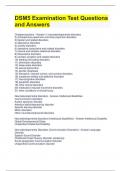Exam (elaborations)
DSM5 Examination Test Questions and Answers
- Course
- Institution
DSM5 Examination Test Questions and Answers Chapters/sections - Answer-1) neurodevelopmental disorders 2) schizophrenia spectrutm and other psychotic disorders 3) bipolar and related disorders 4) depressive disorders 5) anxiety disorders 6) obsessive compulsive and related disorders 7) t...
[Show more]



